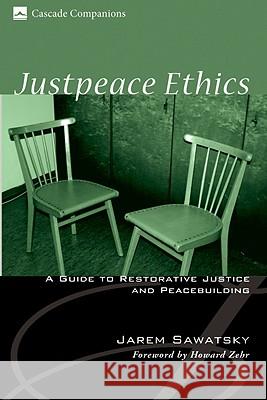Justpeace Ethics: A Guide to Restorative Justice and Peacebuilding » książka
Justpeace Ethics: A Guide to Restorative Justice and Peacebuilding
ISBN-13: 9781556352997 / Angielski / Miękka / 2009 / 98 str.
Justpeace Ethics: A Guide to Restorative Justice and Peacebuilding
ISBN-13: 9781556352997 / Angielski / Miękka / 2009 / 98 str.
(netto: 58,72 VAT: 5%)
Najniższa cena z 30 dni: 60,82
ok. 16-18 dni roboczych.
Darmowa dostawa!
Description: People too often enter into conflict with an eye on how to resolve, manage, or transform it, thereby losing sight of the people involved and the end desired. Justice and peace too often serve as abstract ideals or distant shores. We have not yet learned enough about how these ends can also be the means of conflict resolution. Drawing on the imaginations of some leading peace and restorative justice practitioners, Justpeace Ethics identifies components of a justpeace imagination--the basis of an alternative ethics, where the end is touched with each step. In this simple companion to justpeace ethics, Jarem Sawatsky helps those struggling with how to respond to conflict and violence in both just and peaceful ways. He offers practical examples of how analysis, intervention, and evaluation can be rooted in a justpeace imagination. Endorsements: With wisdom and sensitivity, Justpeace Ethics explores how justice and peace become one. There is genius in the way it holds together diverging values: interconnectedness and individual uniqueness, immediate care and long-term thinking, change and humility, needs-focused action and nonviolence, empowerment and responsibility. In such an ethic, life is sacred, relationships are central, and justice is beautiful. A must read for those who long for a better world. - John Derksen Conflict Resolution Studies Menno Simons College Winnipeg, Canada This book is an enormously valuable contribution to thinking about doing justice and building peace. . . . Justpeace Ethics provides an immensely practical guide to those seeking to build peace and justice. At the same time, it is anything but a simple 'how to' book. Rather, the patient reader is rewarded with an account of the values of restorative justice and peacebuilding that is deeply sophisticated, philosophically profound, and rooted in awareness of the complexity of thinking and acting ethically. -Professor Gerry Johnstone, author of Restorative Justice: Ideas, Values, Debates This book provides a fresh and provocative perspective on the intersection of restorative justice and conflict transformation. . . . This is a must-read for conflict resolution academics and practitioners. -Neil Funk-Unrau, Conflict Resolution Studies, Menno Simons College, Canadian Mennonite University About the Contributor(s): Jarem Sawatsky is Assistant Professor of Peace and Conflict Transformation Studies, Canadian Mennonite University.
Description:People too often enter into conflict with an eye on how to resolve, manage, or transform it, thereby losing sight of the people involved and the end desired. Justice and peace too often serve as abstract ideals or distant shores. We have not yet learned enough about how these ends can also be the means of conflict resolution. Drawing on the imaginations of some leading peace and restorative justice practitioners, Justpeace Ethics identifies components of a justpeace imagination--the basis of an alternative ethics, where the end is touched with each step. In this simple companion to justpeace ethics, Jarem Sawatsky helps those struggling with how to respond to conflict and violence in both just and peaceful ways. He offers practical examples of how analysis, intervention, and evaluation can be rooted in a justpeace imagination.Endorsements:With wisdom and sensitivity, Justpeace Ethics explores how justice and peace become one. There is genius in the way it holds together diverging values: interconnectedness and individual uniqueness, immediate care and long-term thinking, change and humility, needs-focused action and nonviolence, empowerment and responsibility. In such an ethic, life is sacred, relationships are central, and justice is beautiful. A must read for those who long for a better world.- John DerksenConflict Resolution StudiesMenno Simons CollegeWinnipeg, CanadaThis book is an enormously valuable contribution to thinking about doing justice and building peace. . . . Justpeace Ethics provides an immensely practical guide to those seeking to build peace and justice. At the same time, it is anything but a simple how to book. Rather, the patient reader is rewarded with an account of the values of restorative justice and peacebuilding that is deeply sophisticated, philosophically profound, and rooted in awareness of the complexity of thinking and acting ethically.-Professor Gerry Johnstone, author of Restorative Justice: Ideas, Values, DebatesThis book provides a fresh and provocative perspective on the intersection of restorative justice and conflict transformation. . . . This is a must-read for conflict resolution academics and practitioners.-Neil Funk-Unrau, Conflict Resolution Studies, Menno Simons College, Canadian Mennonite UniversityAbout the Contributor(s):Jarem Sawatsky is Assistant Professor of Peace and Conflict Transformation Studies, Canadian Mennonite University.











